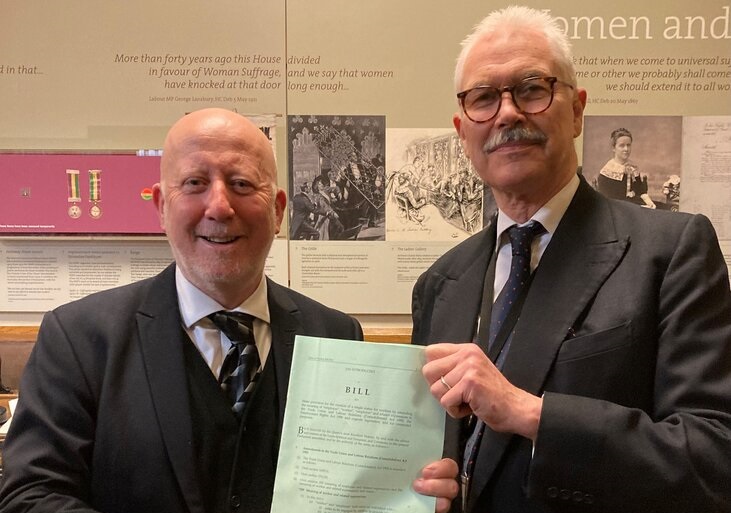Status of Workers Bill passes from the Lords to the Commons
Ground-breaking Bill aims to abolish insecure work by replacing the UK’s overcomplicated employment status system with a universal status of worker

Earlier today, Andy McDonald MP introduced the Status of Workers Bill to the House of Commons. The ground-breaking Bill, which aims to abolish insecure work by replacing the UK’s overcomplicated employment status system with a universal status of ‘worker,’ began as a Private Members Bill presented by John Hendy QC in the Lords in May 2021. If passed into law, the Bill would mean that all people in employment, who are not genuinely self-employed, would have the same workers’ rights, including to claim unfair dismissal.
The Status of Workers has passed three readings in the House of Lords, under the guidance of Lord Hendy. Today, it was signed by Andy McDonald, former Shadow Minister of Employment Rights, in the House of Commons, and will wait to be heard as a Private Members Bill.
In the UK, your relationship with your employer can be legally defined in one of three ways:
- Employee – a traditional working relationship, with a contract, regular hours or shifts, and a guaranteed wage.
- Limb (b) worker – a casualised form of labour in which there is no guarantee of regular hours or pay. This includes most workers on zero-hour contracts and working in the gig economy, as well as some agency workers.
- Self-employment – under this category, there is bogus self-employment, personal service companies and, finally, genuinely self-employed people run their own business on their own account with their own clients and customers.
While employees are eligible for all workers’ rights (after relevant qualifying periods), limb (b) workers have only basic rights such as to rest breaks, holiday pay and the National Minimum Wage. Self-employed people have no workers’ rights.
Crucially, limb (b) workers have no right to claim unfair dismissal and have no legal protection in the case of redundancy. This makes them easy to hire and fire, leaving them in a chronic state of job insecurity and vulnerable to exploitation from employers.
The Status of Workers Bill replaces this overcomplicated employment status system with a universal status of ‘worker’ that applies to everybody except for the genuinely self-employed. In addition, the Bill will flip the presumption so that it is for the employer to prove their contractors are self-employed, rather than for workers to prove they are not self-employed. This will make it much more difficult for employers to mislead their workforce. The House of Lords library has produced a comprehensive guide to the Bill here.
The effect of the Status of Workers Bill, if passed into legislation, would be felt particularly in the so-called gig economy, where ‘bogus self-employment’ is rife and misclassification of worker status has led to inequality of rights, pay, terms and conditions. But the reforms it would initiative would be felt throughout the economy, as those inequalities are addressed across sectors.
The status of workers’ bill’s proposals were part of Labour’s 2019 General Election manifesto, where working people would have been granted sweeping new employment and trade union rights if Labour had won. Labour’s Worker’s Rights Manifesto, which drew inspiration from the work of the IER over many years, can be found here.
Preparing to introduce the Status of Workers Bill to the House of Commons today, Andy McDonald, Labour MP for Middlesbrough, commented:
“Millions of workers throughout our economy are denied basic rights and protections, because of bogus and exploitative employment practices.
All workers, regardless of sector, wage, or contract type, should be given the same rights and protections, including rights to sick pay, holiday pay, parental leave, protection against unfair dismissal and many others.
A single status for all will also clampdown on bogus self-employment and unscrupulous employers will no longer be able to treat their staff like regular employees whilst falsely claiming they are not, denying staff rights they are owed as employees. The many good businesses that treat workers well will no longer be undercut by those that choose to use loopholes in the current system to deny workers their rights.
If the government was really interested in levelling up, it would throw its weight behind this bill in the Commons today, and ensure that it becomes law without any unnecessary delay.”
Back in September, the Institute of Employment Rights (IER) produced a briefing on the Bill, which can be read here, and a discussion of the status of workers issue (including a quiz), which can be found here. John Hendy, Chair of the IER, who introduced the original Private Members Bill in the Lords, said:
“The Tories promised an Employment Bill to improve workers’ rights. Instead, they have introduced legislation to make unions pay for a state official, the Certification Officer, to investigate and fine them. They have proposed new restrictions on picketing and other forms of demonstration. And they are looking at workers’ EU rights to see which they can remove from British workers.
In contrast, the Status of Workers Bill sets out to give all employment rights from day one to all who work for a living – with the exception of those who are genuinely self-employed with their own clients. This will benefit hundreds of thousands of workers who are unwillingly put into categories which do not have full rights.
My Bill was widely supported across the House of Lords (except by the government), and I am delighted that Andy McDonald will be steering it through the Commons.”







